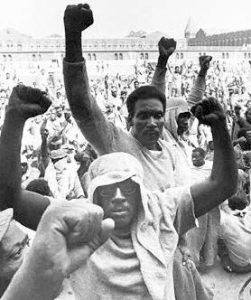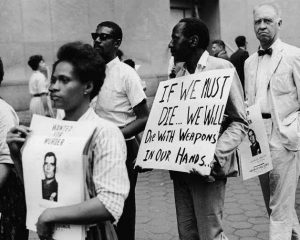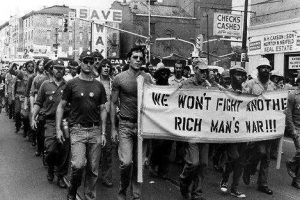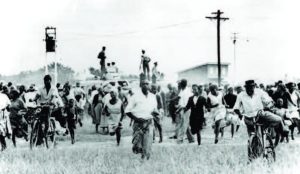Our future depends on which class holds state power. That’s a big reason why ICWP commemorated the Bolshevik revolution. With the leadership of the Russian Communist Party (Bolshevik) the working class smashed the capitalist state. They held state power for the first time. This great achievement echoed throughout the world and reverberates to the present day.
The 1971 Attica prison rebellion in New York (USA) faced the raw, brutal power of this capitalist state. A powerful history of the uprising, Blood in the Water (2016) makes this all too clear.
The lesson should be that nothing less than communist state power will do. This book doesn’t address this. Instead, it implies that the slaughter of 42 inmates and guards, the shooting of 128 and the months of brutal torture of over a thousand prisoners, many severely wounded, could have been avoided if more humane voices had prevailed.
Two groups had a clearer understanding of what was at stake. First, the prisoners. A young white prisoner, Blaze Montgomery, said solemnly, “I want everyone to know we gone stick together [Black, Puerto Rican and white], we gone get what we want, or we gone die together.”
Governor Rockefeller led the other group. He had inherited the Standard Oil fortune. His family name was practically shorthand for the U.S. ruling class.
Rockefeller told one of his speech writers that “there is a …political problem, centering on the well-organized national effort of revolutionaries…to wreck the penal system as one more step toward the ultimate destruction of this country.” He and his cronies continually blamed Maoists and Marxists and invoked the specter of a communist conspiracy.
Rockefeller knew that the power of the capitalist state required the penal system to mete out punishment, torture and death. That’s what he and his minions visited upon the Attica rebels for months after the uprising.
New York State troopers justified this wholesale slaughter with open racism. “Get that n****r!” was heard throughout the prison yard.
Attica means…
“How did this start?” asked a Boeing Red Flag distributor who was among many who once chanted “Attica Means Fight Back!”
In 1970, New York City prisoners revolted against overcrowding and other grievances. City officials relieved this overcrowding by sending many young prisoners upstate.
Many were familiar with left-wing revolutionary politics. Many had been politicized by anti-racist urban rebellions, including the Harlem (New York City) rebellion in 1964 that had openly communist leaders. Some recently-returned Vietnam vets had rebelled while in the bosses’ army.
When the Attica rebellion started on September 9, chaos reigned. But within hours the rebels chose a group of revolutionaries as leaders. They occupied a central table in D Yard and quickly organized security and medical aid. All decisions were collectively discussed among the nearly 1300 rebels. The prison had never seen such harmony and organization under the guns of the prison guards.
One leader was the stirring L.D. Barkley, a twenty-one-year-old black prisoner. According to his mother, he liked to read about communists. He commanded the respect of those much older than he and of all races. He led the drive to unify the prisoners.
Many saw him alive after the prison yard was retaken, including a Buffalo assemblyman. A few days later he turned up among the dead, assassinated. Thousands attended his funeral with raised fists.
Barkley was sent to Attica for a parole violation. His original “crime” was forging a money order for $124.50.
In communism, nobody will go to jail for forging a money order. There will be no money orders and no need for money. Everyone will get what they need and will be encouraged to contribute according to the best of their abilities. Most capitalist crimes would disappear along with vast prison populations.
…Smash the Bosses’ State, Fight for Communist Workers’ Power!
“Attica really didn’t mean fight back,” concluded our Boeing friend. He now asks whether the fight has to be for communist state power. Our May Day kickoff potluck will sharpen this Attica discussion with other workers and students.
When the working class and its International Communist Workers’ Party take power, the nature of state power will be transformed beyond recognition. We won’t have a government separate from the party and the masses it mobilizes for communism. Since the masses will rule, we’ll have no need to pretend that the government is a neutral arbitrator between classes.
The Russian communists took state power, but maintained the fiction of some separate government apparatus. They needed those institutions, laws and processes to support socialism’s wages, money and profits. The working class eventually lost state power.
We will immediately end wages, money and profits and the whole superstructure needed to preserve these aspects of the capitalist mode of production. Party collectives everywhere will involve masses. This time we’ll hold onto power by continuously mobilizing these masses for communism.

Attica Prison Rebellion, 1971

By 1971, revolution was in the air. The Harlem Rebellion of 1964

Vietnam Veterans Against the War

The Sharpeville Massacre in South Africa, 1960, transformed the anti-apartheid struggle

